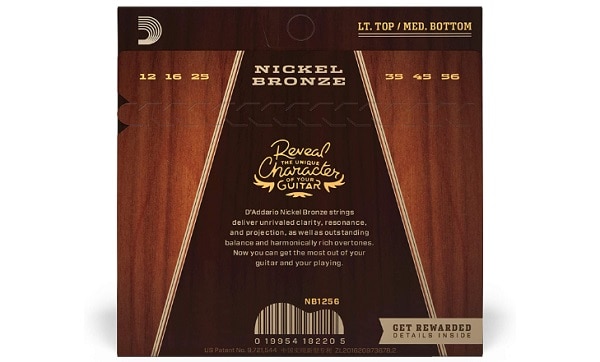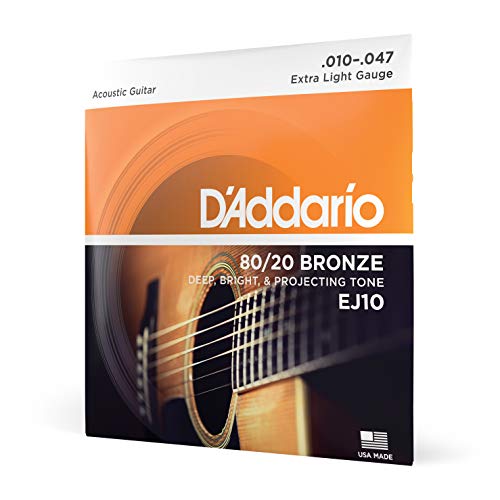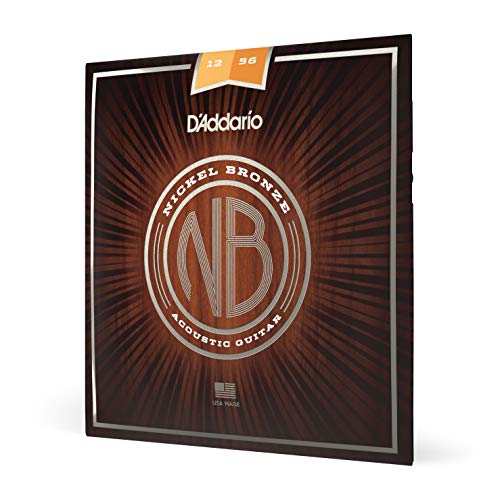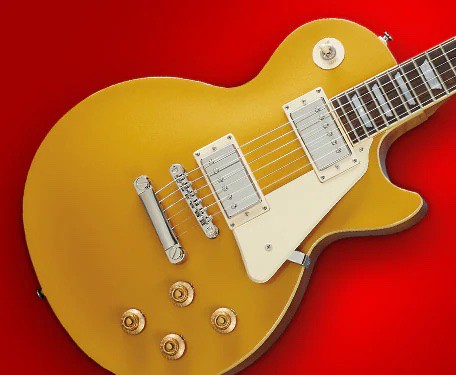Guitar strings are one of the most important topics for aspiring and accomplished players as they ultimately determine the instrument’s sound. Hence, the phosphor bronze vs 80/20 guitar strings comparison can hardly be avoided by anyone who takes guitar playing seriously.
As an essential element of any guitar setup, the choice of guitar strings is perhaps the most personal one, as it usually reflects the guitar player’s current sound preferences.
Phosphor bronze or 80/20 guitar strings are far from being your only options as other types of steel acoustic strings may be better suited for your style of playing.
Each type of guitar string has specific properties that result in a slightly different sound, and it may be difficult to determine which type is best suited for you unless you try using all of them before opting for one type or the other.
Engineered to endure, these acoustic strings constructed with phosphor bronze wrap wire boast a dynamic balance of rich, full-bodied tone and sparkling high-end clarity.
Our phosphor bronze vs 80/20 guitar strings comparison will hopefully help you choose the string set that best complements your acoustic guitar.

Phosphor Bronze vs 80/20 Guitar Strings: The Main Differences
The main differences between phosphor bronze and 80/20 guitar strings are:
- 80/20 guitar strings were first used in the 1930s, whereas the phosphor bronze acoustic guitar string were created in the 1970s
- Phosphor bronze guitar strings contain 92% copper, whereas the 80/20 strings feature just 80% copper
- 80/20 guitar strings age quickly, whereas the phosphor bronze guitar strings are not prone to corrosion
- Phosphor bronze strings produce a natural sound, whereas the 80/20 strings are known for their bright tone
- 80/20 guitar strings can be impacted by the user’s sweat, whereas exposure to sweat doesn’t affect bronze phosphor strings
Sound, durability, and maintenance requirements are some of the most noticeable differences between these two types of acoustic guitar strings. Despite their shortcomings, 80/20 acoustic guitar strings are still popular among professional guitar players and hobbyists.
Key Specifications between 80/20 & Phosphor Bronze
| Phosphor bronze | 80/20 | |
| Material | 92% bronze, 8% tin, and less than 1% phosphor | 80% bronze, 20% zinc |
| Coating | Available with and without coating | Available with and without coating |
| Gauge | Extra light, light, medium, and heavy | Extra light, light, medium, and heavy |
| Average lifespan | Several months | One month or less |
| Tone type | Warm and natural | Bright with accented bass |
| String core | Round and hex | Round and hex |
| The latest price | Check the latest price here | Check the latest price here |
Examining the features of Phosphor Bronze vs 80/20 guitar strings
Let’s take a closer look at phosphor bronze and 80/20 guitar strings.
Phosphor Bronze Guitar Strings
Most guitar players like to experiment with different types of strings for acoustic guitars, and sooner or later they end up trying one of the countless phosphor bronze models.
These strings are available in all gauges, which means that you can use them if you want to accentuate treble or bass in the sound your guitar is making.

This is arguably one of the most popular types of acoustic guitar string options as they are both durable and affordable. Even so, how long phosphor bronze strings are going to last depends on your playing style, as a more aggressive style of play tends to wear out the strings faster.
The warm sound these strings produce is preferred by country and folk musicians.
Key features
- 92% of copper, 8% of tin
- Available in all types of gauges
- The average lifespan is between two and three months
- Available with and without coating
- Not prone to rusting
- Produce a characteristic warm sound
- Suitable for all type of concert and dreadnaught guitars
A brief history
The addition of phosphor to the bronze and tin alloy was considered revolutionary when phosphor bronze guitar strings first hit the market because it extended their durability.
In fact, these guitar strings were developed in order to overcome the shortcomings of the 80/20 strings that were dominating the market at the time.
Phosphor bronze guitar strings were first introduced in 1974 by the D’Addario company and since then they’ve become one of the most common types of strings for acoustic guitars.
Should you buy guitar strings in bulk? Read here to find out.
Materials and durability
The process of making phosphor bronze guitar strings is not much different than for any other type of steel guitar string.
Manufacturers use the core wire or the so-called music wire and wound their strings using either of the four common wounding methods.
The term phosphor bronze refers to the material from which the wounding of the string is produced. As we already noted, phosphor makes these guitar strings less prone to corrosion which in turn increases their durability.
In addition, these strings contain 92% copper and 8% tin which ensures that you can break them in after just a few hours of playing time.
Sound
Only a seasoned professional can notice the variations of sound produced by different types of steel guitar strings.
In general, the bass isn’t going to be as accentuated if you use the phosphor bronze strings as it would be on 80/20 strings.

Moreover, your guitar is going to sound somewhat warmer with phosphor bronze strings since they highlight the mid-range tones.
In case your guitar doesn’t have a large body, choosing the phosphor bronze strings may be a good option because they are going to magnify its properties.
Other noteworthy features
Phosphor bronze strings are available in different gauges, so you must decide which string gauge is best suited for your style of playing. Opting for a higher string gauge may help you highlight the bass, while lower gauges increase the instrument’s treble.
The coating can increase the durability of phosphor bronze guitar strings by preventing them from aging quickly and reducing their susceptibility to corrosion.
It is also worth pointing out that the exact features of a phosphor bronze string set depend on the manufacturer and the model. That’s why you must go through all the features a phosphor bronze string set offers before you purchase it.
Reliability – Are phosphor bronze strings good?
Even the sturdiest guitar strings on the market are not resistant to aggressive styles of playing, so how long you can rely on a set of phosphor bronze guitar strings depends on your style of play.
In most cases, you won’t have to replace these strings more frequently than once every few months. Phosphor bronze strings don’t age rapidly, although their sound changes slightly when they wear out.
Whether you are a professional musician or just learning the ropes of the trade, choosing phosphor bronze strings is going to make your guitar sound great.
Engineered to endure, these acoustic strings constructed with phosphor bronze wrap wire boast a dynamic balance of rich, full-bodied tone and sparkling high-end clarity.
80/20 Guitar Strings
After being the only type of acoustic guitar string for decades, 80/20 strings have lost some of their original fame. Even so, they are still one of the common types of acoustic guitar strings on the market, as a wide range of models feature the brass alloy.
These guitar strings are famous for their distinctive sound, and countless musicians still use them despite their lack of durability.

In addition, it doesn’t take long to break these guitar strings in, as they reach their full sound potential after just a few hours of playing time.
However, they require regular maintenance since a string conditioner can extend their lifespan for several weeks. You will also have to bear in mind that keeping your guitar in humid conditions will cause the 80/20 guitar strings to age faster.
Key features
- 80% copper, 20% zinc
- Recognizable bright tone
- Available in all gauges
- Great fit for dreadnaught and concert acoustic guitars
- Known to age faster than other types of acoustic guitar strings
- Versatile and suitable for a broad range of music genres
- 80/20 guitar strings highlight low-frequency tones
A brief history
The 80% copper and 20% zinc alloy was used to produce the first steel strings for acoustic guitars. Their creators John D’Addario and John D’Angelico selected this alloy for its bright sound properties.
Since the mid-1930s when 80/20 guitar strings first became available on the market were the only type of steel guitar strings until the invention of bronze phosphor strings.
Although they lost some of their popularity they are still highly praised by musicians for their ability to produce a bass-heavy and bright sound.
Materials and durability
Sometimes referred to as brass strings, the 80/20 guitar strings contain 80% copper and 20% zinc. They are wound using one of four traditional wounding methods, and the wound strings process depends on the model you are interested in.
Like all other types of steel guitar strings, the 80/20 strings can have a round or hex core, while their base wire is made of high carbon steel. However, a high concentration of zinc makes these guitar strings prone to corrosion which impacts their durability.
Consequently, they have higher upkeep requirements than other types of acoustic guitar strings.

Sound
Playing any rock n’ roll album from the 1960s or early 1970s will provide you with instant insight into the sound of the 80/20 guitar strings.
The bright guitar sound you can hear in rock n’ roll classics like Bob Dylan’s ‘Blowing in the Wind’ or the Beatles’ ‘Yesterday’ can partially be attributed to the 80/20 strings. Using these strings on a dreadnought guitar will also highlight the bass.
However, the mid-tones may not sound as good as they sound on phosphor bronze guitar strings but that doesn’t mean that your instrument is going to have poor sound quality if you opt for an 80/20 set of strings.
Other noteworthy features
You can choose from a full range of gauges, as 80/20 guitar strings are available in extra light as well as heavy gauges. Which one you are going to choose depends on the model of your guitar and the sound you want to get.
These steel acoustic guitar strings can be used on any type of acoustic guitar, but they are the best fit for jumbo and dreadnaught models that usually have larger body sizes.
Moreover, opting for a set that has a coating will ensure that 80/20 strings are going to keep their sound for at least a month.
Reliability
The high percentage of zinc makes 80/20 guitar strings relatively unreliable, as they are more prone to corrosion than other types of steel guitar strings. Some guitar players think that sweat can be the reason why these guitar strings wear out so quickly.
Nonetheless, 80/20 guitar strings are inexpensive, so changing them on a monthly basis is not going to burn a hole in your budget.
Professional musicians and novice guitar players can use these acoustic guitar strings, as they can enhance the sound properties of any acoustic guitar.
80/20 Bronze features a bright tone mixed with deep and projecting bottom end, and corrosion-resistant packaging.
Phosphor Bronze vs 80/20 guitar strings – Pros and Cons
Phosphor Bronze Pros
- Natural and balanced sound
- High corrosion resistance
- An excellent choice for country musicians
- Available in all standard gauges
Phosphor Bronze Cons
- Bad fit for jumbo acoustic guitars
- Performance capabilities depend on the manufacturer
80/20 guitar strings Pros
- The bright bass-heavy sound
- Great fit for large body size guitars
- Versatile and suitable for playing different genres of music
- Inexpensive
80/20 guitar strings Cons
- Limited lifespan
- Some guitar players can find the midrange tones on 80/20 guitar strings underwhelming
The best alternatives to phosphor bronze and 80/20 guitar strings
The sound produced by 80/20 or phosphor bronze guitar strings may not fit the genre of music you want to play. Experimenting with other types of acoustic guitar strings may help you find the sound that matches the genre of music you want to make.
That’s why we are going to take you through some of the best alternatives to either of these guitar strings. So, let’s take a closer look at their features.
Silk and Steel Strings
A warm mellow sound, low tension, and almost no string noise are some of the main characteristics of Silk and Steel guitar strings.
Sets like Martin Guitar MA130S or D’Addario EJ40 combine the properties of steel acoustic guitar strings like 80/20 and nylon string options that are commonly used on a classical guitar.
Martin Authentic Acoustic Strings provide excellent tuning stability and playability with bright and rich tones.
They consist of the steel core wire and an outer wrap wire but they have a silk filament that is positioned between these two components.
Although finding extra light or light gauges of Silk and Steel strings shouldn’t be a problem, heavy gauges are rare as they are produced by a handful of manufacturers.
The low tension makes it easier to finger chords correctly, which is the reason why silk and steel strings are a great choice for an inexperienced guitar player.
Nickel bronze
If you are looking for a set that will enable you to make the most of your instrument’s tonal capabilities then you should consider using D’Addario’s Nickel Bronze guitar strings.

However, nickel bronze strings are not very common, as they are produced by just a few brands. They feature a steel core and a nickel-bronze winding which ensures their durability and reduces chances of corrosion.
In addition, tuning these strings shouldn’t be too difficult and they are not likely to break during this process.
The sound these acoustic guitar strings make is suitable for various genres of music and you can use them during studio sessions and live performances.
You should keep in mind that sets like the D’Addario’s Nickel Bronze guitar strings are not coated.
Nickel Bronze provides a guitar with unrivaled clarity, resonance and projection, as well as outstanding balance and harmonically rich overtones. Since this uncoated set also features D’Addario’s proprietary NY Steel core, players will also enjoy improved tuning stability and higher break resistance.
Aluminum bronze
Yet, another variation of traditional bronze strings, sets like Ernie Ball Medium Light Acoustic Set produce a crisp sound that differs from the sound created by 80/20 guitar strings only slightly.

These differences in sound become more obvious when a guitar is mic’d up, as they offer a richer and clearer sound than 80/20 strings.
Aluminum bronze strings are not prone to corrosion which makes them more durable than most 80/20 sets.
You can choose between models with round and hex cores, or opt for sets that have different gauges.
However, finding an aluminum bronze guitar string set may prove to be challenging as they are not available in all music stores.
Aluminum Bronze Acoustic Strings are made with Ernie Ball Maraging Steel hex cores and Aluminum Bronze wrap wire which provide more pronounced lows coupled with crisp brilliant highs.
Frequently asked questions about phosphor bronze and 80/20 guitar strings
Question: What is the best brand of Phosphor bronze guitar strings?
Answer: D’Addario, Elixir, or John Pearse are among some of the leading brands that produce phosphor bronze guitar strings of all gauges.
Question: Is tuning phosphor bronze guitar strings difficult?
Answer: Tuning phosphor bronze guitar strings isn’t more difficult than tuning any other type of acoustic guitar strings. This task may seem complicated for a novice player but it becomes easier as you get used to your instrument.
Question: How to know if 80/20 strings are a good fit for my guitar?
Answer: 80/20 guitar strings fit better on guitars that have larger body sizes, so if you have a jumbo dreadnought or a vintage guitar model then 80/20 strings may be a good option for you.
Question: How often should I change 80/20 strings?
Answer: Although there is no strict time frame within which you have to change 80/20 strings, these sets start to lose some of their sound capabilities after one month of use.
How often you will have to replace 80/20 strings depends on how frequently you are playing the guitar, your style of play, and the conditions in which you keep your instrument.
The Verdict – Should I use phosphor bronze or 80/20 guitar strings
Engineered to endure, these acoustic strings constructed with phosphor bronze wrap wire boast a dynamic balance of rich, full-bodied tone and sparkling high-end clarity.
The choice between phosphor bronze and 80/20 guitar strings boils down to durability since a set of 80/20 strings can rarely outlast a set of phosphor bronze strings.
Even though they make your guitar sound slightly different, these differences are only noticeable by trained musicians.
However, phosphor bronze strings create a warmer sound that may be better suited for country and folk music, whereas 80/20 strings that don’t accentuate mid-range tones as much.
It is worth pointing out that either of these acoustic guitar strings can be used to play different genres of music.
Hopefully, our phosphor bronze vs 80/20 guitar strings comparison has provided you with the information you needed to decide which type of acoustic guitar strings is a better fit for your guitar.
Leave a comment and let us know or check out our guide on how to choose the right guitar strings.
Embrace the opportunity to discover your musical talents with Guitar Center's exceptional Daily Pick, designed to unleash your inner musician. With the finest offer of the day, you can indulge in a world of musical possibilities and take your skills to new heights.
- The Yamaha FG800 vs FG830: Which to Pick? - August 23, 2023
- Best Martin Guitar Options: How to Pick the Right One - August 22, 2023
- Best Gypsy Jazz Guitars: How to Pick the Right One? - August 22, 2023







